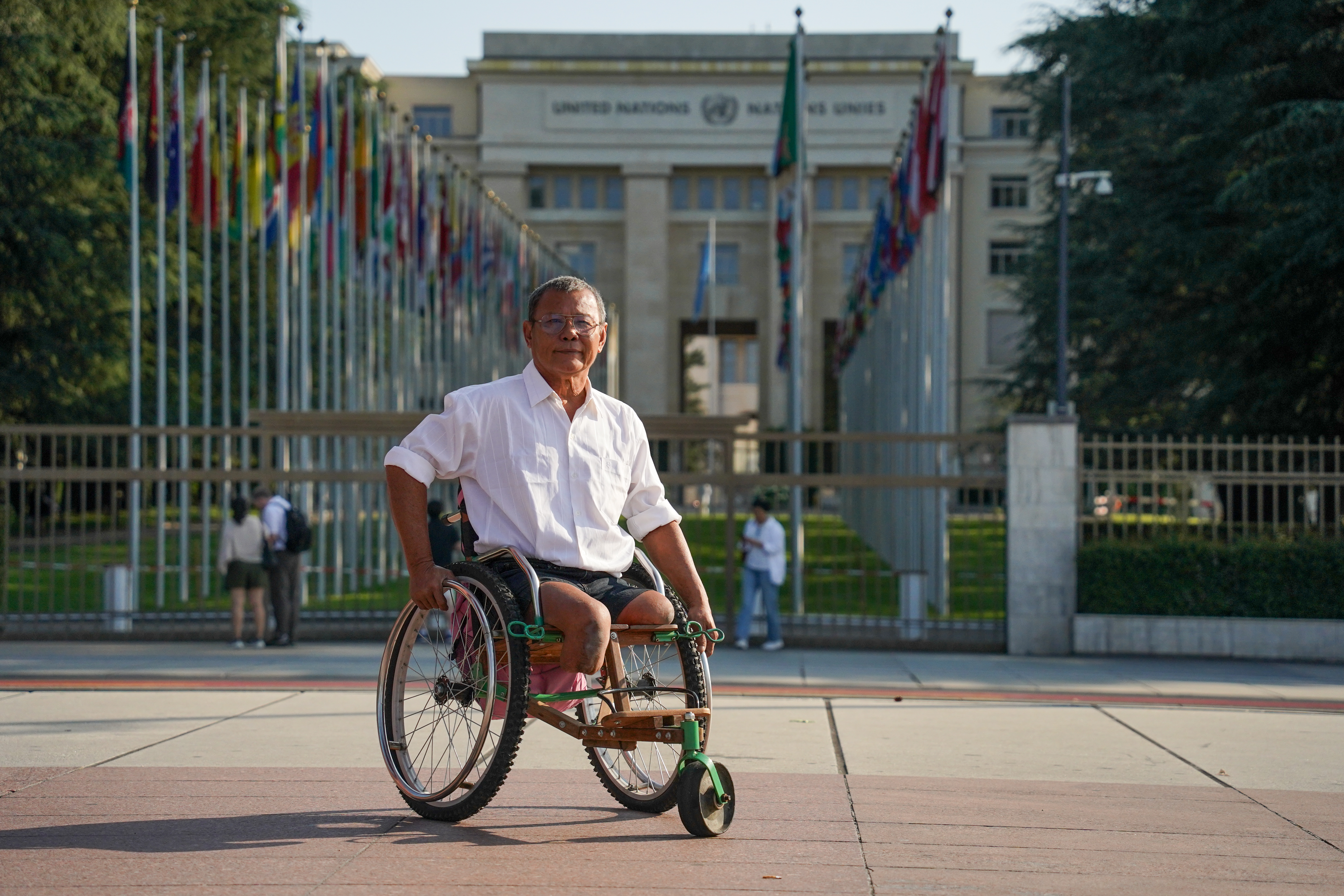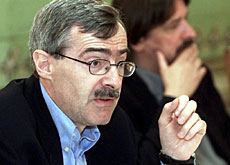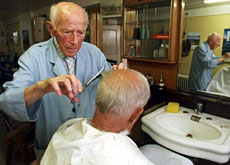
Employers urge Swiss to be open to reforms

Peter Hasler, the director of the Swiss Employers’ Association, is firmly behind reforming the pension system and raising the retirement age.
In an interview with swissinfo, Hasler also argues that Switzerland’s economy can only get back on track once it opens up its markets.
As the October 19 parliamentary elections approach, reform of pensions and social security has been dominating the political debate.
Hasler is backing proposals by the interior minister, Pascal Couchepin, to trim pension benefits and raise the retirement age in two stages from 65 to 67.
Unions refute Couchepin’s suggestion that the reforms are necessary to “save” the state pension system. They say the impact of growing numbers of pensioners could easily be absorbed by an economic upswing.
swissinfo: What is the employers’ position, especially after the trade unions’ massive rally on September 20?
Peter Hasler: Our life expectancy has increased and the population is getting older as birth rates have gone down in recent years. This is the reason why there are more and more shortfalls in Switzerland’s retirement provisions. It’s a demographic problem – there are not enough workers to finance the rising number of pensioners.
Switzerland has been dealing with this problem for the past ten years. We can’t change demographics and that applies to Europe as a whole. And how are we going to finance pensions if not through taxes?
swissinfo: What are your suggestions?
P.H.: Tax hikes are pretty unpopular because even though Switzerland has always been proud of its low tax rates, this perception is changing.
There are also proposals to increase the retirement age, cut pensions or raise social security contributions. These suggestions are very controversial, because pensioners are worried that the quality of their services will deteriorate.
Pascal Couchepin’s proposal to increase the retirement age has come under fire, even though it would only be introduced from 2010. We can’t understand the protests because the fact that we have a higher life expectancy means we are also getting healthier and fitter.
swissinfo: But are employers interested in employing 67-year-olds in the medium term?
P.H.: In principle, yes. But this is more difficult when the economy is sluggish, like now. Demographic studies have shown that the number of people of a working age will decrease even further in the next few years, which means there’ll be greater demand for workers.
This demand can either be met by employing older people, foreigners or more women. But Switzerland’s population is already 20 per cent foreign and I don’t think the Swiss are very keen to increase this percentage.
For this reason, we think older people will have a better chance of finding a job as of 2010.
swissinfo: How would you evaluate the work of the interior ministry and the economics ministry over the past two years?
P.H.: Unlike his predecessor, Pascal Couchepin has tackled problems head-on and proposed tough solutions. Ruth Dreifuss often played down the scale of the problems or denied their existence.
The economics minister, Joseph Deiss, has continued the work in the style of his predecessor [Couchepin] and we are pleased about that. It is important that he does not pursue economic policies that use up public funds.
swissinfo: How do employers judge the difficult economic situation in Switzerland?
P.H.: It is mainly Switzerland’s own fault that it is not doing very well at the moment. Our market has not been liberalised like many other markets and this has led to weak competition among small and medium-sized enterprises as well as among local companies.
The lack of competition has led to high prices and expensive living costs. Switzerland is one of the most expensive countries in the world – and high salaries are not the answer to this problem because purchasing power remains weak.
We have also put too much financial burden on the government, which has led to an increase in taxes. We are running the risk of not being able to return to the necessary growth rate, which is about two per cent per year.
We were also too slow at doing trade with the European Union. We are very afraid of the EU, especially when it comes to the free movement of people.
swissinfo: What issues will be on your agenda during the coming legislative term?
P.H: The most important thing is growth, closely followed by tougher competition and lower prices. We also want to make sure that we are able to keep our social security without raising taxes.
We also want to improve women’s working conditions by pursuing a good family policy. Childcare and the re-integration into professional life are very important.
swissinfo: What is happening to the cherished Swiss notion of peaceful relations between employers and employees?
P.H.: Overall the situation has not changed that much in the past ten years. Most of the workers are content and the massive strikes making the headlines are mainly organised by one single union in the construction sector.
I think it’s a shame that the construction workers’ union keeps on calling illegal strikes, which is damaging the relationship between employers and employees.
We need to have a different solution for each industry. Introducing early retirement all over Switzerland would be the wrong approach. Office workers don’t necessarily have to take early retirement whereas it’s completely different for construction workers.
swissinfo interview: Alexander Künzle and Marzio Pescia (translation: Billi Bierling)
Hasler says there are no enough workers to finance Switzerland’s future pension commitments, which is why reform is needed.
He says that because people live longer and are healthier, it is reasonable to raise the retirement age.
Hasler believes companies will have to employ older people in the future because there will be a shortage of younger workers.
He says workers in some industries, such as construction, should be able to retire earlier than office workers.
The state pension system was created in 1948.
At the time there were 6.5 workers for every pensioner; this year there are four; and in 2030 there will be just two.
The interior minister wants to cut pension benefits and increase the retirement age to 67.

In compliance with the JTI standards
More: SWI swissinfo.ch certified by the Journalism Trust Initiative






































You can find an overview of ongoing debates with our journalists here . Please join us!
If you want to start a conversation about a topic raised in this article or want to report factual errors, email us at english@swissinfo.ch.